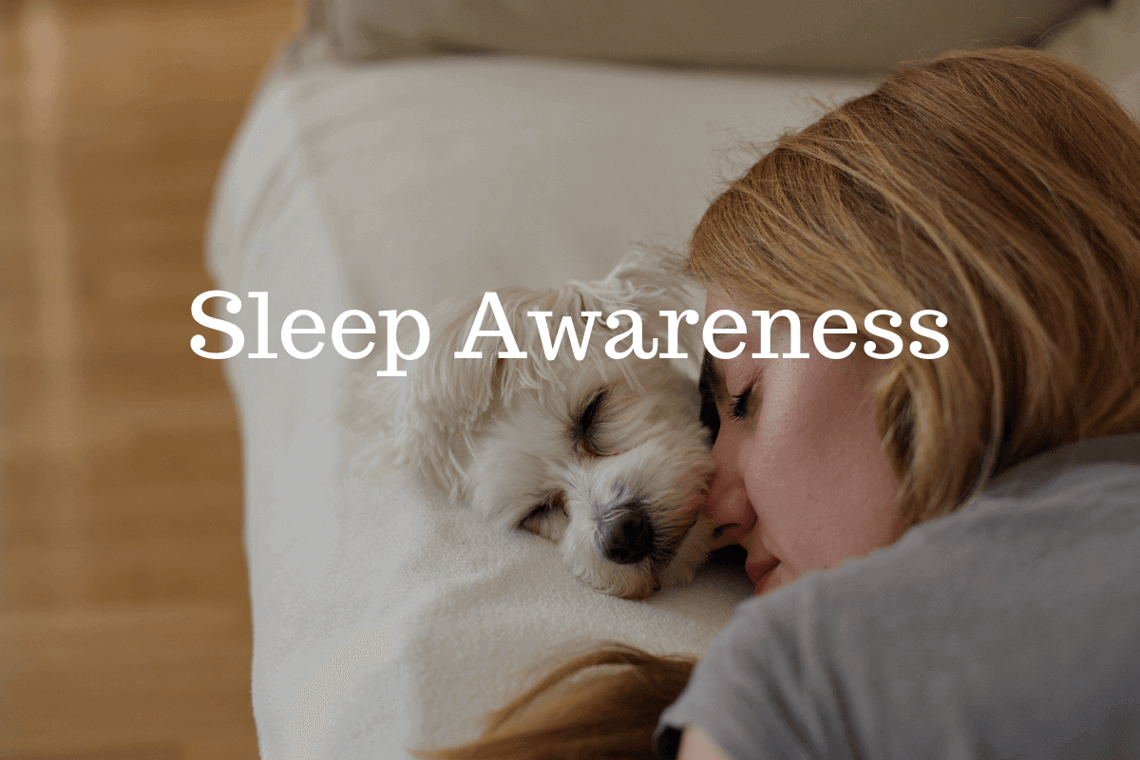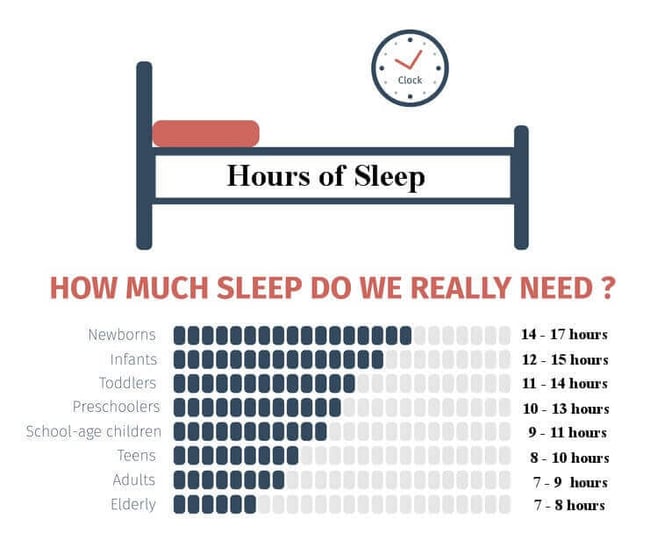
I don’t know a single person who doesn’t love sleep. 6 hours to 8 hours to 10 hours. 15! From the second we hit our head on that pillow, we enter a realm of temporary darkness in which there are no responsibilities, worries, or cares.
But, sometimes, we sleep and dream of our worries. We have nightmares. Or we may not even sleep at all.
And when we can’t sleep, we can’t function.
![]() Importance
Importance![]() Chart
Chart![]() Difficulties
Difficulties![]() Tips
Tips![]() Awareness
Awareness
What Is Sleep Awareness
Sleep awareness is the goal to inform you about the importance of your sleep health and all you can do to help yourself sleep better. With National Sleep Awareness Week coming up (March 10 - 16), we are here to raise awareness on the importance and necessity of sleep, and tp share tips to help you get a good night’s rest.
The Importance of Sleep
We spend one third of our lives asleep, and for good reasons. A good night’s rest provides us the ability to function day-to-day. But sleep does more than help us recover from the day’s events. There are five key elements sleep provides us:(1)
Alert: Allows our minds to regain focus and tackle mental challenges.
Boost Memory: Shapes memories and make connections between events, feelings, and experiences.
Fight Infection: Wards off infections. The less sleep you get, the weaker the immune system.
Be Active: Increases energy levels and mental awareness is more acute. Tied to improve athletic performance, including greater speed, agility, and reflexes.
Replenish: Repairs the damage caused by stress, UV rays, and other harmful exposures.
If we aren’t getting enough sleep, we become prone to short and long-term risks. Such risks include automobile accidents, with drowsy driving responsible for as many as 1550 deaths and 40000 injuries per year on roads.(2)
In addition, occupational injury, obesity due to increased appetite cause by sleep deprivation, mental illness such as depression and substance abuse, and a poorer quality of life can debilitate someone due to less sleep.
How Much Sleep Do I Need?
According to helpussleep.com, each range varies. Here is a chart below that lists the ages that corresponds with each sleep hours:(3)

Sleep Difficulties
Can’t fall asleep at night? There may be a medical reason why.(4)
Below are a list of common sleep disorders that may be interrupting your dreamless sleep:
Excessive Sleepiness is a serious symptom of feeling excessively sleepy. Roughly 20% of the population can be classified with this symptom.
Obstructive Sleep Apnea is when breathing is briefly and repeatedly interrupted during sleep.
Insomnia is a sleep disorder of having difficulty falling or staying asleep. Insomnia can be caused by psychiatric conditions such as depression.
Shift Work Disorder is a chronic condition that affects those with an irregular work schedule.
Non 24 Sleep Wake Disorder affects the 24-hour synchronization of circadian rhythms, which comes from a lack of light perception. Cases occur in cases of blindness and in sighted people.
Narcolepsy is a neurological disorder that affects the control of sleep and wakefulness. Those that suffer experience excessive daytime sleepiness and uncontrollable episodes of falling asleep during the day.
Restless Leg Syndrome, also known as Willis-Ekbom Disease, is the disorder known for unpleasant urges to move the legs while at rest. Symptoms are most severe in the evening and nighttime hours.
Tips to Help You Sleep
There are many ways to help you achieve the rest you deserve. While there is no medical treatment to follow, you can take melatonin pills as a way to fast track your sleep chemical. Besides melatonin, here are other effective ways to combat your lack of sleep:(5)
- Stick to a sleep schedule to help regulate your body’s clock.
- Practice a relaxing bedtime ritual can help wash away any stress, anxiety, or excitement.
- Avoid naps if you have trouble sleeping at night since they will take up most of your rest.
- Exercise daily and get those endorphins going!
- Sleep on a comfortable mattress for optimum comfort and relaxation.
- Moderate your bedroom to a noiseless, cool environment.
- Use bright light to manage circadian rhythms.
- Avoid alcohol, cigarettes, coffee, and heavy meals in the evening since they disrupt sleep.
- Wind down so your body can shift to sleep mode.
- Relax until you feel tired.
- See a doctor if any of the above steps aren’t effective or you’re still feeling restless at night.

And above all, remove electronics, such as TV, computers, laptops and smartphones, from your resting area. The bright light disrupts your melatonin, the chemical in your brain that is released before sleep.
ASMR can also be a great tool to help you sleep since it helps induces a relaxing sensation across the body. ASMR, or autonomous sensory meridian response, is the feeling of well-being combined with a tingling sensation in response to a stimulus (Dictionary.com). It has become a YouTube sensation, where ASMRtists post their own stimulating content for those that want to experience ASMR, and especially for those who need help sleeping.
Speak to your doctor. They are there for your needs. Don’t be afraid to tell yours if you’re having trouble sleeping.
Food and drink can also be another great tool to help you sleep at night. For example, chamomile tea and passionflower tea can be useful to help close your eyes. Eating almonds, fish, and oats are also great digestables that can improve your nighttime rest.(6)
Raising Awareness
The best way to raise awareness for sleep is to get involved!
Start with social media! Although screens can be a big contributor to a lack of sleep, they can also be beneficial in spreading the word! Share posts, blogs (like this one), or any other information you have through Twitter, Instagram, etc. and alert your friends.
Attend walks with local charities and organizations. These five patient organizations are here to help you or anyone you know with a sleep disorder:(7)
- American Sleep Apnea Association
- Circadian Sleep Disorders Network
- Narcolepsy Network
- Restless Legs Syndrome Foundation
- Wake Up Narcolepsy
Join the National Sleep Foundation this week with Sleep Awareness Week, March 10 - 16. The theme this year, “Begin With Sleep,” highlights the importance of good sleep health.(8)
Talk to a friend suffering from a lack of sleep. We encourage chatting one-on-one with someone who struggles with sleep will help them begin their journey to an optimal night’s rest.
Lastly, order your very own sleep awareness wristband today! The awareness colors for sleep disorders are black. Customize your silicone wristband today and help spread awareness one custom wristband at a time.
Final Thoughts
All anyone wants at the end of the day is to fall into their covers and drift away into the clouds. With keen awareness on our sleeping habits, we are able to notice and address the inconsistencies we have with our rest.
Resources:
.png)
.png)
.png)


.png)
.png)

.png)
.png)
.png)
.png)
.png)
.png)
.png)
.png)
.png)
.png)
.png)
